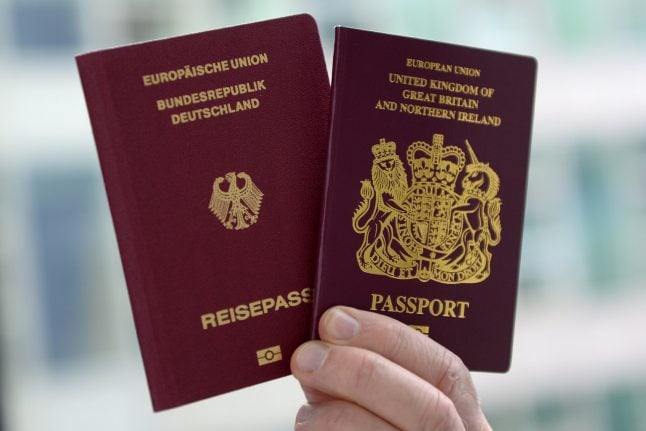Former Royal Air Force airman Paul Hughes never imagined saying it, but he admits that he was almost “ashamed of my fellow countrymen” when Britons voted to leave the EU last June.
“I was devastated,” he tells AFP.
Since the fateful referendum last summer, 34-year-old Hughes – along with a growing fraction of the roughly 106,000 British citizens in Germany – has taken the unexpected step of applying for German citizenship.
“I'd prefer not to have to go through the process and the rigmarole of doing it, but I want to keep the rights and the ability to travel within Europe,” he explains.
Over the past three and a half years, the former serviceman has made extensive use of the EU freedom to live and work in any of the bloc's 28 member countries, moving with his German wife first to Amsterdam and then to Wiesbaden, near Frankfurt.
But that freedom has come under a cloud in recent weeks, as the British government has refused calls to guarantee the rights of EU citizens to remain in Britain once Brexit goes ahead.
That leaves unresolved the question of a reciprocal guarantee from Brussels for the roughly one million Brits living in other EU countries.
Hughes says he realized that in London, “nobody's looking out for us, nobody cares” – prompting his first visit to the immigration office.
Authorities in Hamburg, Berlin, Bavarian capital Munich and the federal state of Hesse told AFP growing numbers of Brits are doing the same.
Dual nationality
So long as Britain remains an EU member, those who don't want to give up their allegiance to Queen and country can become dual citizens, adding a German passport emblazoned with the austere federal eagle to the UK's lion-and-unicorn coat of arms.
But Germany does not allow dual citizenship for non-EU nationals, except in certain circumstances: such as children with one German and one foreign parent or descendants of those persecuted by the Nazis.
That window of acquiring a second passport is therefore fast closing as Prime Minister Theresa May is set to trigger two-year exit negotiations this month.
“I wouldn't give up my citizenship,” says former airman Hughes, thinking of his medals and service history in Iraq.
Nevertheless, he says that the Brexit vote has made him less likely to move back in the near future.
When he visits family and friends in Swindon, “we can't talk about Brexit around the table, because it turns into a fight”.
The subject is touchy enough that Hughes has so far avoided bringing up his plan to become German on visits back to the UK.
German citizenship in particular throws up challenging questions for modern-day Brits.
Hamburg-based journalist, author and translator Brian Melican recounts how friends in France and the UK – countries with deep memories of war with Germany – noticed he had begun saying “we” when referring to his adopted homeland.
New Germans “take on not guilt but responsibility” for their country's inescapable history, the 32-year-old feels. “It's changed the way I view myself.”
Living in Germany for nine years and fluent in the language, Melican's intention to apply for citizenship crystallized when then-Prime Minister David Cameron claimed a surprise majority in 2015 elections, after promising voters a referendum on EU membership.
He found himself at a naturalization ceremony by December that year.
“I certainly feel less British now” he muses. “It's just a big change, it's on a par with marriage and having children. It's one of the biggest changes of status you can have.”
A big part of the sense of responsibility the naturalization process hammered home is engaging with politics and civil society.
“Now I'm observing elections as somebody who will be taking people at their word. It's made me take more of a stake here,” he says.
Foot in both worlds
For 39-year-old teacher and translator Becky Allenby, there were two very important reasons why she applied for German citizenship – her children.
“They were born here and they would say to people that they're German,” the Berlin resident of nine years' standing explains.
“I wanted them to have the paper that went with their emotional attachment.”
Before last June, questions of national identity were not pressing for Allenby, her two young sons, and her Australian-born partner, all Britons.
“Before, as a European citizen, I could juggle my world, my family, my friends, and my neighbourhood, and it's all fine. And it's like suddenly with Brexit someone drew a line across all that,” she goes on.
Allenby too has avoided discussing the process with her Brexit-supporting parents – although not for fear of hostility to Germany.
“They just want their grandkids to be British, and they would also love us to go back,” she says.
Even if the family does return, their dual nationality will just formalize something Allenby already feels before getting her German papers.
“Part of me will always feel German now,” she says.
“I've lived such crucial years of my life here – I will always feel like I've got one foot in both places.”
By Tom Barfield, AFP



 Please whitelist us to continue reading.
Please whitelist us to continue reading.